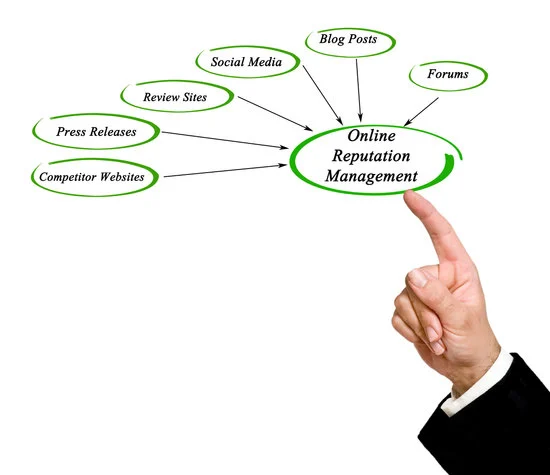It’s no secret that social media can make or break your online reputation.
A single tweet (X-ing???) or Facebook status update can reach thousands of people and give them an instantly negative impression of you or your brand.
That’s why it’s so important to be proactive about protecting your online reputation on social platforms.
Click this Spotify podcast to listen to this blog.
In this blog post, we’ll share some tips for doing just that. So whether you’re looking for reputation management for doctors, reputation management for celebrities or simply are a business owner or private citizen who wants to maintain a positive online presence, read on!

ORM is the industry acronym for Online Reputation Management.
What is online reputation management (ORM)?
Online reputation management experts will tell you that ORM is the process of monitoring, identifying, and influencing the digital footprint that an individual or organization leaves behind on the Internet.
In other words, it’s all about controlling what shows up when someone Googles your name.
Most people are aware of their personal ORM – after all, you probably Google yourself every once in a while to see what comes up.
But businesses also need to worry about their online reputation, as it can have a big impact on their bottom line.
In fact, studies have shown that a negative reputation can cost a company anywhere from $200,000 to $1.5 million in lost revenue each year.
There are a number of different ways to manage your online reputation, but the most important thing is to be proactive about it. You can’t just sit back and hope that everything will work out – you need to take control of your own destiny.
You can always consult with an ORM firm to help manage your online reputation.
But to get started…
ORM & Review Management Strategies to Protect Your Online Reputation
1 – Be aware of what’s being said about you online
The first step in managing your online reputation is to simply be aware of what’s being said about you through a diligent review monitoring process to respond to negative reviews.
You can’t fix a problem if you don’t know it exists, so it’s important to keep tabs on what people are saying about you online, and especially on social platforms.
There are a number of different ways to do this. You can set up Google Alerts for your name, so that you’ll receive an email any time your name or business or product is mentioned on the Internet.
You can also use social media monitoring tools like Hootsuite Insights or Mention to track mentions of your name across the web.
2 – Make sure you have a strong presence on social media
Social media is one of the most important tools in your ORM arsenal. It’s a great way to build relationships with customers and create a positive image for your brand.
However, social media can also be a double-edged sword. It’s important to make sure that your social media profiles are clean and polished, and that you’re not posting anything that could damage your reputation.
3 – Respond to negative comments quickly and calmly
If someone leaves a negative comment about you online, it’s important to respond quickly and calmly.
Don’t get defensive or argue with the person – that will only make the situation worse.
Instead, try to defuse the situation and turn it into a positive.
For example, if you own a restaurant and someone leaves a negative review on Yelp, you could reach out to the customer and offer them a discount on their next meal.
Or, if you’re a politician and someone leaves a negative tweet about you, you could respond with a witty comment that will make them look bad.
The key is interaction.
4 – Monitor your online presence regularly
The best way to protect your online reputation is to monitor your online presence regularly. This means checking your Google Alerts, social media accounts, and other online channels on a regular basis.
If you see something negative about you online, don’t panic – take a deep breath and follow the tips above. With a little bit of effort, you can turn a negative situation into a positive one.
5 – Hire an ORM company
If you don’t have the time or resources to manage your online reputation yourself, you can always hire an ORM firm to do it for you. These firms specialize in online reputation management and they know how to fix and prevent negative publicity.
Just be sure to do your research first – not all ORM firms are created equal. Make sure you choose a firm that has a good track record and that knows what they’re doing.
As a five-star rated digital marketing company in California, Avita Group has been managing online reputation for doctors, lawyers, celebrities and even your next door neighbor for over a decade.
In doing so, Avita Group has learned that ORM can involve activities such as search engine optimization (SEO), online reputation monitoring, online brand management, and social media management.
There are a number of different ways to protect your online reputation, but the most important thing is to be proactive about it. You can’t just sit back and hope that everything will work out – you need to take control of your own destiny.
The Benefits of ORM
There are many benefits to maintaining a good online reputation. In today’s digital world, ORM is essential for both individuals and businesses.
A positive online reputation can help you:
- Get hired or promoted
- Attract more customers or clients
- Win over investors
- Get better deals from suppliers
- Be seen as an expert in your field
- Boost your self-confidence
The Risks of ORM
While there are many advantages to having a good online reputation, there are also risks associated with ORM.
These include:
- Identity theft
- Online scams and fraud
- Defamation and libel
- Cyberbullying

Learn the various areas to look for an ORM strategy that is going in the wrong direction.
How to manage your online reputation on social media
As a business owner, it’s important to protect your online reputation on social media. One way to do this is by managing your privacy settings.
Make sure you’re only sharing content with people you trust, and be careful about what you post.
You can also use social media management tools and tools for online reputation management to help you keep track of your posts and comments. These tools can help you keep an eye on your brand’s reputation and quickly respond to any negative comments.
If you experience a negative event online, make sure you take swift action to address the issue. Respond to any criticisms publicly, and try to resolve the situation as quickly as possible.
Ignoring the issue will only make it worse.
As a business owner, you know that your online reputation is important. After all, potential customers will likely research your company before doing business with you. And what they find online can make or break their decision to work with you.
That’s why it’s so important to protect your online reputation on social media platforms.
Here are four tips to help you manage your online reputation:
1 – Manage your social media accounts carefully
The first step in protecting your online reputation is to carefully manage your social media accounts. This means being strategic about the content you post and ensuring that all of your posts reflect positively on your brand.
It also means regularly monitoring your accounts for negative comments or reviews and promptly responding to them. Ignoring negative feedback will only make it worse.
Only post content that you are comfortable with being seen by the general public. And be mindful of the tone and language that you use in your posts. You also want to avoid posting any potentially controversial or inflammatory content.
Before you hit the “post” button, ask yourself if what you’re about to share is something you’d want the whole world to see.
If the answer is no, then don’t post it.
Also, don’t overshare or over post.
It’s important to remember that not everyone needs to know every detail of your personal life. When sharing information on social media, think about who might be interested in reading it.
It’s also a good practice to not post anything you wouldn’t want your boss to see.
Even if you’re not sharing sensitive information, it’s important to remember that anything you post on social media could potentially be seen by your boss. So, think twice before posting anything that could reflect negatively on you at work.
2 – Don’t spam your followers
Nobody likes to be spammed, so don’t do it to your social media followers. This means avoiding excessive self-promotion and instead focus on providing value.
For example, you could share helpful tips related to your industry, share interesting articles, or even just post about company news or updates. As long as you’re not constantly bombarding your followers with sales pitches, they’ll appreciate it.
3 – Be professional
When managing your social media accounts, always remember to be professional. This means avoiding profanity, offensive language, and anything else that could reflect poorly on your brand.
Also, be sure to stay on top of current events and avoid posting anything that could be construed as insensitive or offensive.
In addition, respond to negative comments in a positive way.
If you do come across negative comments about yourself online, don’t get defensive. Instead, take the high road and respond in a positive, professional manner.
4 – Beware of scammers
Finally, be aware of scammers who may try to exploit your online reputation. They may attempt to create fake profiles or websites that are designed to damage your reputation.
We recommend using privacy settings to restrict access to your account to only those who you trust. You also may want to consider creating separate social media accounts for professional and personal use.
Also, be sure to use common sense and verify any information you find online before taking any action. Stay positive and proactive online, even in the face of negativity.
By following these tips, you can protect your online reputation on social media platforms and ensure that your brand remains positive and professional.
Case studies of successful ORM campaigns
Online reputation management experts will tell you that social media platforms are a great way to connect with your audience, but they also provide a megaphone for haters and trolls.
Here are a few case studies of successful ORM campaigns:
1 – Samsung Mobile
When Samsung released their Galaxy Note 7, it quickly became clear that there were some major problems with the device. The phones were catching on fire, and Samsung was facing a PR nightmare.
Samsung’s social media team responded quickly, issuing an apology and recalling all of the devices. They also launched an online campaign called “The Truth About the Galaxy Note 7”. This campaign featured videos and social media posts from customers who had switched to other devices like the iPhone 7 or the Google Pixel.
The campaign was a success, and it helped to improve Samsung’s online reputation. In fact, their perception scores increased by 15 points after the launch of the campaign.
2 – Nestlé
Nestlé was facing some negative attention online after it was revealed that they were using unsustainable palm oil in their products.
Greenpeace launched a social media campaign called “Nestlé: Stop Destroying Rainforests”, which quickly went viral.
In response, Nestlé created a task force to address the issue and committed to only using sustainable palm oil by 2020. They also launched an online platform called “The Forest Promise” where they shared updates on their progress.
Thanks to their quick response and transparency, Nestlé was able to turn the negative attention into positive PR. And their reputation scores increased by 5 points as a result.
3 – Virgin America
Virgin America was struggling to compete with the big airlines, and they knew that they needed to improve their online reputation. So they hired Reputation.com to help them create a social media campaign called “The Virgin America Difference”.
The campaign focused on sharing positive stories about the airline, and it was a huge success. As a result, Virgin America’s reputation scores increased by 15 points.
These are just a few examples of how you can protect your online reputation. By being proactive and using a variety of tactics, you can ensure that your online reputation remains intact.
In Conclusion
As a business, it is important to protect your online reputation, especially on social media platforms.
By being aware of the different ways that you can be attacked and taking steps to prevent them, you can help safeguard your company’s name. In addition, by monitoring what is being said about your brand online, you can quickly address any negative comments and work to turn them around into positives.
As always, the best defense is a smart and well-executed offense.
Avita Group – Digital Marketing Agency in California
Avita Group is one of the longest-tenured, five-star rated digital marketing agencies in California. Our clients often have had previous agency experiences and ultimately find a long-term home with Avita Group.
We offer fractional CMO services to boost your brand and your business by maximizing your SEO and PPC management, Online Reputation Management (ORM), and ways to become a LinkedIn ads expert to boost your business.
The Avita Group team boasts a collective experience of over 30 years in the industry led by Founder and CEO, Brad Weber, and has worked with a variety of multi-million dollar companies to help them improve their ROI, build better brand awareness, and mitigate negative online reviews.
Contact us for a free consultation to evaluate how we can transform and elevate your business.
